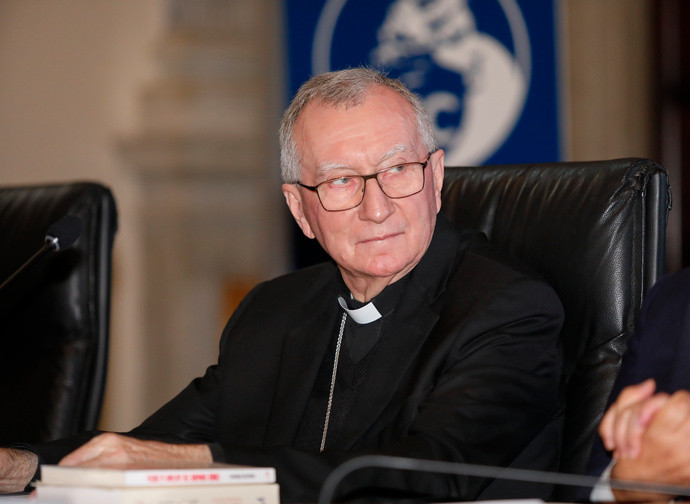Vatican set to renew controversial agreement despite China’s betrayal
For Cardinal Parolin, Vatican Secretary of State, the secret agreement with China must be renewed. And this time it should be definitive. Nothing counts, neither Beijing's violations of the agreement nor the growing persecution of Catholics who resist kowtowing to the Party, including those in Hong Kong.

The Holy See is intent on renewing the secret agreement made with China in 2018 and then renewed every two years. This was said by Vatican Secretary of State Cardinal Pietro Parolin, to a question from LifeSiteNews' Rome correspondent Michael Haynes.
The China Vatican agreement expires in October, and, Cardinal Parolin said, "we hope to renew it". And in this regard, he added, "we are dialoguing with our interlocutors on this point".
On the Holy See's willingness to go ahead despite the Chinese communist regime proving to be unreliable, there was no doubt, given how things have gone over the past six years; but the Vatican Secretary of State's statement is nonetheless important. True, there are still several months to go before an official decision is made, but after two two-year renewals, the final word on the agreement is expected this year: either it becomes final or it is dropped.
And everything suggests that, barring sensational twists and turns, it is going towards finality: the Holy See has already accepted everything - including the unacceptable - in order to reach this point; the Chinese government under these conditions has only to gain, because it can proceed with the annihilation of the Catholic Church with Vatican endorsement.
The issue does not only concern the appointment of bishops, which - the Holy See has always said - is the central theme of the secret agreement, but the process of sinicisation of the Catholic Church that the regime has been pursuing since at least 2015 and that is becoming increasingly suffocating as well as now extending to the Church in Hong Kong.
Even though three bishops were appointed earlier this year - Thaddeus Wang Yuesheng for Zhengzhou, Anthony Sun Weniun for the new diocese of Weifang, Peter Wu Yishun for the apostolic prefecture of Shaowu - with the approval of the Pope and therefore formally according to the China-Vatican agreements, in substance it seems clear that the mechanism works like this: the Communist regime decides and the Pope gives his assent.
Moreover, even if we want to consider the appointment of the three bishops with Vatican approval as a positive fact, the application of this part of the agreement does not at all stop the persecution of priests and bishops who do not accept subordination to the Communist Party: For example, at the beginning of January, almost at the same time as the three episcopal appointments mentioned above, Monsignor Peter Shao Zhumin, bishop of Wenzhou, who is not recognised by the government, was arrested for the umpteenth time, guilty of not wanting to join the Patriotic Association of Chinese Catholics (APCC), the instrument used by the regime to "guide" the Catholic Church. But such episodes are not to be counted, as well as various obstacles placed in the way of participation in Eucharistic celebrations.
But the most relevant aspect is the fact that the Chinese regime, for any act concerning the Catholic Church, never mentions the Holy See and the Pope, let alone the agreements. An aspect highlighted well by a recent and enlightening article by PIME missionary Father Gianni Criveller, editorial director of Asia News. This is what happens when bishops' appointments are announced, but "the silence on Rome's role" is even more evident in the "Five-year plan for the Sinicization of Catholicism in China (2023-2027)", approved on 14 December last by the Conference of Catholic Bishops and the Patriotic Association (bodies both under the control of the Communist Party).
Comprising the equivalent of 3,000 words, divided into four parts and 33 paragraphs, the Plan, says Father Criveller, "never mentions the Pope and the Holy See; nor the agreement reached between the Vatican and China. Instead, leader Xi Jinping is mentioned four times. Five times it is reiterated that Catholicism must take on 'Chinese characteristics'. The word "sinicisation" is the main one: it recurs no less than 53 times'. Sinicisation obviously means the total subordination of the Church to Communist Party directives.
It is not just a question of the frequency of the words, what is significant is "the firmness and peremptoriness of the language". "As if there had been no dialogue and no rapprochement with the Holy See," writes Father Criveller, "as if the recognition given by the Pope to all the Chinese bishops counted for nothing; as if there was no agreement between the Holy See and China that offers the world the impression that Roman Catholicism has found hospitality and citizenship in China".
In the face of this attitude on the part of the Chinese regime, which evidently heads straight for its own way, which envisages the total subjugation of the Church to the directives and demands of the Communist Party, the position of the Vatican Secretariat of State appears incomprehensible.
The art of diplomacy, which must proceed even in small steps, is one thing; it is quite another to sacrifice the truth and even the Catholic faithful to logics that are essentially political. It is before everyone's eyes that in order to keep alive the possibility of an agreement with the Chinese regime, the Holy See and the Pope have been silent for years now on the escalation of anti-Catholic persecution in China, nor a word is spent for the Catholics of Hong Kong, who are increasingly in the crosshairs also thanks to the new infamous law on national security (see here and here). And let us recall that in Hong Kong Bishop Emeritus Cardinal Joseph Zen was arrested and is now still on trial; while for three years the (converted) Catholic businessman Jimmy Lai, publisher of a daily newspaper critical of Beijing (and now closed), has been serving hard jail time, and in another ongoing trial even faces life imprisonment.
Reason of state cannot justify this scandalous silence that condemns bishops, priests and lay people loyal to the Church to persecution. Bishops, priests and lay people who have already paid dearly for their loyalty to the Church and now see themselves abandoned even by Rome. The determination with which Cardinal Parolin - who has the full support of the Pope on this - is leading the Holy See to embrace the communist regime is worrying. And the consequences do not only concern the Chinese Church.
"Jimmy Lai, persecuted by China, abandoned by the Vatican"
As Hong Kong tightens its national security law, the famous Catholic dissident risks being jailed for life. Father Robert Sirico attended the last hearing of his trial: 'He saw me, I blessed him and he was moved'. A crucifix drawn in prison is now on display at the Catholic University of Washington. The closeness of Cardinal Zen, the silence of Rome and the Church in Hong Kong.
Pope's 'odd' words on China and Cardinal Zen
When Pope Francis' spoke about Cardinal Zen, on the return flight from Kazakhstan, it sounded like he preferred to abandon him to his fate in order to save diplomatic relations with China. Moreover, he took a strictly political and unreligious approach to Vatican relations with China.

